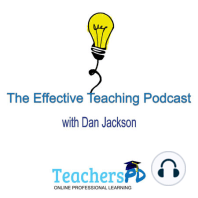10 min listen

Episode 30 Five Characteristics of Great Feedback
Episode 30 Five Characteristics of Great Feedback
ratings:
Length:
10 minutes
Released:
Feb 23, 2020
Format:
Podcast episode
Description
In this episode I am going to provide you 5 characteristics of great feedback. The reason I am doing this is twofold. Firstly, because feedback is vital in learning and can be used to help students begin to provide their own feedback and helps to establish them as lifelong learners. And Secondly, because all too often I see teachers getting it wrong. They spend so much time telling students what they did wrong and not nearly enough laying out what the student should be doing to get better next time.No Score Our first characteristic of effective feedback is to ensure you are not providing a score. It has been known now for a long time that if you provide a score on anything that is given back to the student they will look at the score and then the feedback is either completely discarded or seen through the lense of that score. So for example, if Jane was given 40%, if she then reads her feedback it will be read from the position of “I suck at this”. However, if Amy received 90% she may read it from the perspective of “I am already fantastic at this”. Both students therefore do not take in the feedback at all.Given we want our students to:Read the feedback with the intention of improving, no matter where they are atRespond to this feedback by changing what they are doingIt makes sense that we should leave the mark or score off the feedback. This will at least help increase the percentage of students who read the feedback, and hopefully from the right mindset.Give time to improve with the feedback If we want our students to act on any of the feedback, we really should be looking to provide this time in class. This is our second characteristic - give time along with the feedback for students to actually improve. I love asking teachers “What is the best use of class time?” Often we come up with very similar answers, because we all know that it involves something where we are available to actually help our students with the higher-order thinking or at least when we are available to help them develop and learn in their zone of proximal development - that area just beyond what they are currently capable of, but is not so far that it is seen as impossible. This zone normally requires some form of help from the teacher. This could be in the form of feedback, but it can also be in the form or scaffolds, teaching structures, providing guiding questions or something similar.For this reason, I really want to encourage you to provide your students some time in class to read their feedback and then action the feedback. Now, if the feedback is on an assessment that has already been submitted and graded then maybe provide them with something that is similar where they can practice the improvements that you want them to show. Redoing and old assessment task will not often be seen as valuable to a student. But if they are applying the feedback to a new task, they can come around and become much more motivated and active in the learning. So I encourage you to provide both support and a form of action. Provide the minimum support needed for students to improveNow our third and fourth characteristics have already been mentioned, but I will quickly go over them. So the fourth characteristic is to provide the minimum support needed for the student to improve. This is where you might provide a scaffold for them, give them a link to some content if them that they need to revise or even pair them up for an activity where they are working together on another project but applying the feedback. The important bit here is that you are not providing everything they need to improve nor are you doing it for them. You are providing the coaching that they need (and I do often liken my t..
Released:
Feb 23, 2020
Format:
Podcast episode
Titles in the series (100)
Episode 25 Reaching Every Student with Jon Bergmann by Effective Teaching